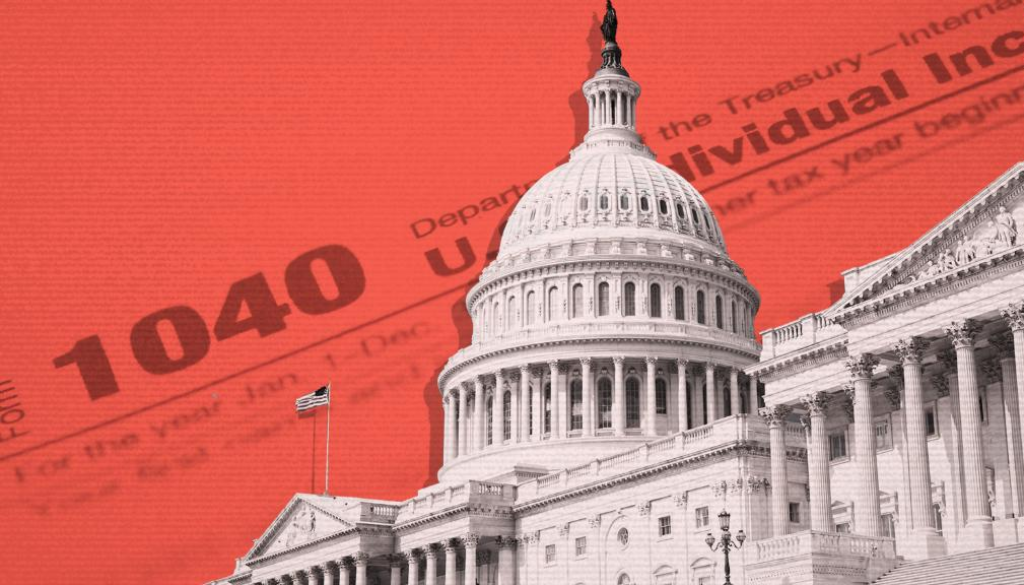Tax Cuts Not Helping Republicans Heading Into November
Contrary to what they believed back in December. Republicans are finding that the tax reform bill is not helping them in the midterm elections.

Bloomberg News is reporting that an internal Republican poll is revealing that the party is not benefiting politically from the tax cut that was passed in December:
A survey commissioned by the Republican National Committee has led the party to a glum conclusion regarding President Donald Trump’s signature legislative achievement: Voters overwhelmingly believe his tax overhaul helps the wealthy instead of average Americans.
By a 2-to-1 margin — 61 percent to 30 percent — respondents said the law benefits “large corporations and rich Americans” over “middle class families,” according to the survey, which was completed on Sept. 2 by the GOP firm Public Opinion Strategies and obtained by Bloomberg News.
The result was fueled by self-identified independent voters who said by a 36-point margin that large corporations and rich Americans benefit more from the tax law — a result that was even more lopsided among Democrats. Republican voters said by a 38-point margin that the middle class benefits more.
When it comes to approval for the tax overhaul, American voters remain torn — 44 percent favor it and 45 percent oppose it.
“Voters are evenly divided on the Tax Cuts and Jobs Act,” the RNC-commissioned report said. “But, we’ve lost the messaging battle on the issue.”
A survey commissioned by the Republican National Committee has led the party to a glum conclusion regarding President Donald Trump’s signature legislative achievement: Voters overwhelmingly believe his tax overhaul helps the wealthy instead of average Americans.
By a 2-to-1 margin — 61 percent to 30 percent — respondents said the law benefits “large corporations and rich Americans” over “middle class families,” according to the survey, which was completed on Sept. 2 by the GOP firm Public Opinion Strategies and obtained by Bloomberg News.
The result was fueled by self-identified independent voters who said by a 36-point margin that large corporations and rich Americans benefit more from the tax law — a result that was even more lopsided among Democrats. Republican voters said by a 38-point margin that the middle class benefits more.
When it comes to approval for the tax overhaul, American voters remain torn — 44 percent favor it and 45 percent oppose it.
“Voters are evenly divided on the Tax Cuts and Jobs Act,” the RNC-commissioned report said. “But, we’ve lost the messaging battle on the issue.”
The tax law slashed the corporate tax rate permanently to 21 percent from 35 percent. It also reduced individual tax rates, doubled the standard deduction, eliminated or capped some itemized deductions, most notably for state and local taxes, and created a special break for pass-through businesses like partnerships until the end of 2025. That year, 25 percent of the gains will go to the top 1 percent while 66 percent of the benefits will go to the top one-fifth of earners, according to an analysis from the Urban-Brookings Tax Policy Center.
Taxes are reduced on average for all quintiles of Americans through 2025, although some would pay more due to the limitation of tax deductions. By 2027, after the individual changes have sunset, 83 percent of the benefits will go to the top 1 percent.
Trump signed the law on Dec. 22, after it passed Congress without a single Democratic vote.
The RNC study says Americans worry the tax law will lead to cuts in Social Security and Medicare, concluding that “most voters believe that the GOP wants to cut back on these programs in order to provide tax breaks for corporations and the wealthy.” It attributes that finding to “a fairly disciplined Democrat attack against the recent tax cuts.”
All of this comes as the GOP faces considerable headwinds heading into the midterm elections. In addition to the historical fact that the President’s party tends to lose seats in Congress in midterm elections, there are plenty of other signs that the GOP faces serious challenges to its control Congress. The first, of course, is the Generic Congressional Ballot which continues to show a rising Democratic advantage as we get closer to Election Day, with the numbers at the present time suggesting that Democrats could pick up as many as 40 seats in the House of Representatives when all they need to flip control is a net change of 24 seats. Additionally, President Trump’s job approval continues to be mired in the same historically low levels. Combined with indications that Democratic voters are more enthusiastic heading into November than Republican voters and the prospect for electoral disaster is easy to see.
This should hardly come as a surprise to Republicans or anyone observing the elections, of course. Even when the tax cut bill was being debated in December, polls were showing that the overall bill was not nearly as popular with the general public, as evidenced here, here, and here. Notwithstanding these numbers, party leaders assured members of the House and Senate who may have been reluctant supporters that the tax bill would be for the party in 2018 once it was passed and the benefits of the bill became apparent. As it turned out, the exact opposed happened. By April, the support that had existed for the bill had virtually evaporated and Republicans were blaming that fact not on the bill itself, but on President Trump. More recently, a poll by NBC News and The Wall Street Journal in August found that just 27% of respondents supported the tax reform bill while 36% called them a bad idea. The RealClearPolitics average meanwhile finds that an average of 39% of those polled approve of the bill, while 42.5% disapprove.
From the beginning, Republicans have contended that this bill would boost economic activity and lead to boosts in wages and economic activity that would enure to the benefit of pretty much the entire American workforce to such an extent that it would help them at the ballot box. At least initially, it appeared that they might be right about this. In the immediate aftermath of the passage of the new tax law, several large American employers announced wage increases or bonuses to employees that they said were tied to the new tax bill. In retrospect, it appears that many of the critics of the tax bill who said these announcements that bonuses and wage increases were due to the tax bill were mostly meant to curry favor with President Trump may have been correct, especially in light of reports that most corporations seem to be recycling the increased revenue they’re seeing from lower taxes into stock buybacks rather than wage increases, new hiring, or expansion of their businesses. It appears that voters are noticing that the promises of tax reform, and Republicans are left looking for some other way to save their majority in November. Odds are that, at least in the House, they probably aren’t going find one.



![Mitt Romney Is Right: Corporations Are [Made Up Of] People](https://otb.cachefly.net/wp-content/uploads/2011/08/bilde-512x256.jpg)


How they like focusing on the “message.” As though that which is a pile of horse manure called by another name would smell sweet?
I favor free markets, and minimal regulations (and zero obstructive regulations), but I don’t have any faith in the vast majority of employers paying as much a single penny more in wages or benefits than they absolutely have to.
There are reasons for this, some are even structural and cultural, but the trait can be seen in most cultures in most times. In other words, it’s human nature to want to keep as much as possible and give as little as possible. There are exceptions, of course, but not enough to make a substantial difference.
In other words…we haven’t been able to con the American public, like we thought we could.
Turns out it was easier to sell Trump University that this pile of dung called tax reform.
$1T in deficit spending and we still have the Obama economy, only with higher inflation and lower wage growth.
Republican economic theory has never worked – ever. No amount of messaging is going to change that fact.
OT, but here’s your friendly Brexit report of the day! (John Crace, like usual, hits it out of the park.)
(I guess there is a link–the British ultra-Brexiters have about much of a link to reality as Donald Trump does. With similar consequences predicted.)
Well of course it isn’t helping them…after all, rich people are a small minority in this country…
I guess the whopping $1.50 a week that Paul Ryan bragged would help working people isn’t going over like he thought it would.
I had to up withholding by $300/month because of the tax bill. Now this was due to special circumstances, i.e. kids still in college and dependent but personal exemptions eliminated.
Regardless, my suspicion is that come next spring, people will be surprised that the withold tables were rigged to get them more tax home pay but they will end up having a bigger tax bill than expected and will owe money.
” Voters overwhelmingly believe his tax overhaul helps the wealthy instead of average Americans.”
Actually, this is really good news overall. It establishes that on average, voters are neither as innumerate or naive as they are perceived to be. On the other hand, the breakdown data show that Republicans are either as innumerate and naive as thought or they are liars.
I’m going to give them the benefit of the doubt and go with innumerate and naive. My inner troll is shouting “liars!” though. So sad that my inner troll is soooo cynical. 🙁
Why should tax cuts help Repugs? They’re not helping most Americans either.
I’m not rich, I’m middle class. I have to buy a big new AC soon, which’ll now have a 10% tariff on it. I didn’t get a tax cut, I got a tax increase. Why should I praise trump for having to give an extra $50 to the feds when i buy the AC? You gave billions more to Sam Walton’s grandkids and Jeff Bezos? Yay for you? And now I’m on the hook for more federal debt?
I Sold Out America, and All I Got Was This Stupid T-Shirt